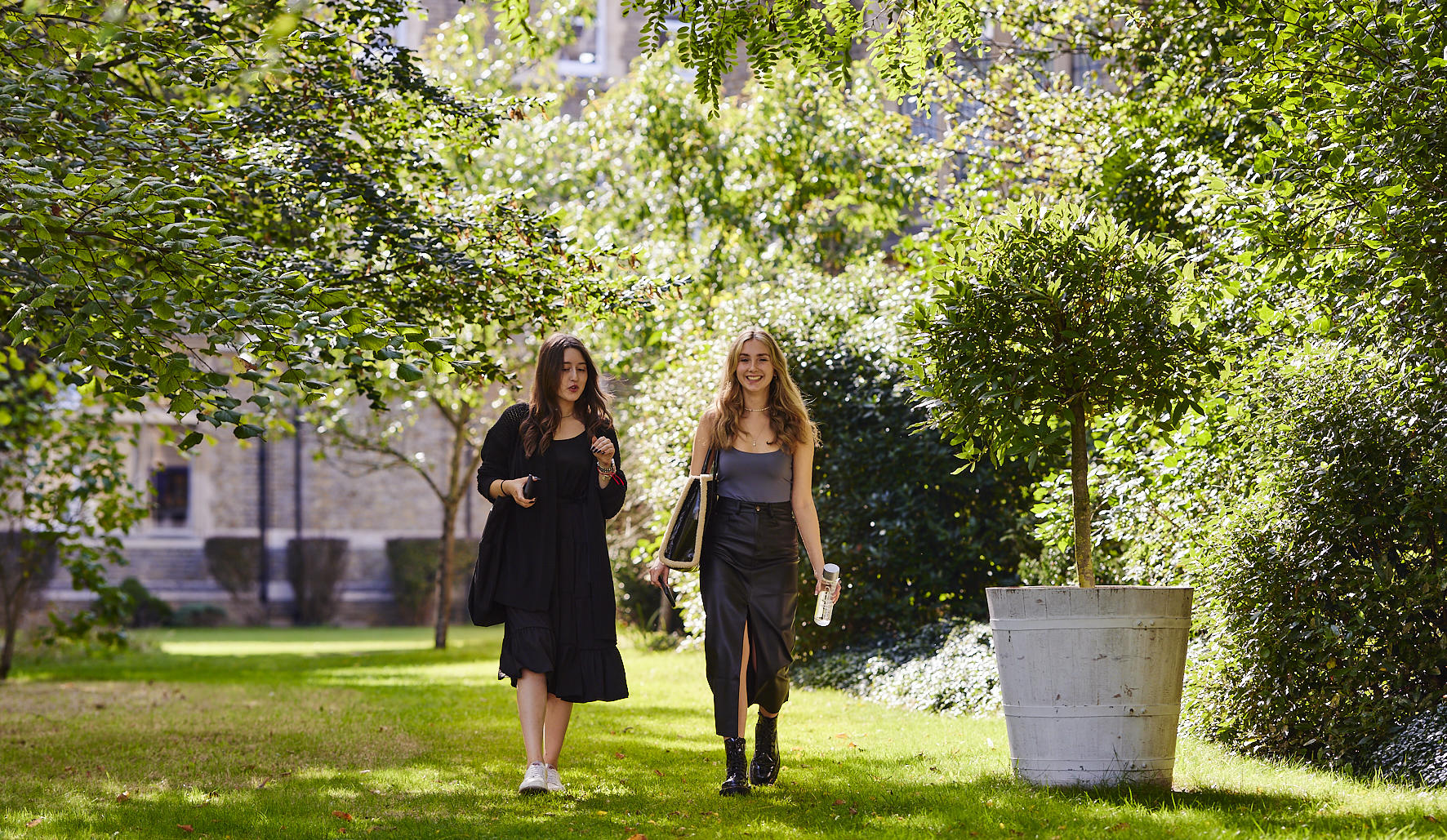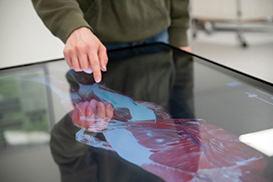St Mary's MBBS: transforming your education for our world
At St Mary’s London School of Medicine, our goal is simple, to develop scientifically and digitally excellent, human-centred medical leaders who are committed to making a sustainable difference to our world.
Why St Mary's?
You’ll train to become human-centred medical leaders through a degree that integrates scientific excellence, digital health, and education with compassionate care and ethical practice.
We will empower future doctors with:
-
Compassion. For your patients, yourself and other students.
-
Ambition. Study world leading science and clinical practice through a values-led curriculum
-
Readiness. Prepare for your future career as you learn through active clinical service in the NHS, from year 1.
-
Excellence. Join a TEF Gold/Top 5* University with brand new, digitally advanced facilities on our nurturing green campus in London.
Clinical experience with compassion
Make a sustainable difference to health inequalities – learn by participating in patient care in diverse UK NHS health settings from Year 1.
Students will learn through active service with patients who need care the most, in bespoke innovative roles:
- Student health coach: in the community tackling preventable illness, lifestyle factors and socialised isolation
- Social action projects: and placements in hospital and community settings
- Patient advocate: working alongside a wider multi-disciplinary team to support patients and improve patient outcomes
- Medics in Schools: enhance your curriculum by teaching and mentoring at local schools in areas of need.
Digital innovation
- Learn about advances in technology, AI, and digital health
- Prepare for clinical practice using our new cutting-edge Integrated Simulation and Skills Centre
- Enhance your learning using our E-Sports Arena and virtual reality
A London School of Medicine with a Global Perspective
Learn in tranquil, nurturing surroundings on our green London campus. You'll be part of our inaugural international community of student doctors.
Locally embedded, globally focused. Our curriculum aligns with the United Nations sustainable development goals (SDGs), preparing doctors who can navigate both local and global challenges.
Enquire now for September 2026
Applications will open in September 2025. In the meantime, you can enquire now.
Subject to GMC approval.

Teaching excellence
St Mary's will be a home away from home. We’ve been educating students since 1850, with an exceptional learning experience to ensure student success. We have a strong reputation for teaching excellence and student experience.
- Top 5 for teaching quality (Good University Guide, 2024)
- Top 10 for student satisfaction (Times Higher Education, 2024).
We’re committed to supporting your learning journey. During your time with us, you’ll get support from pastoral and academic tutors and personalised supervision when you are on clinical placement.
Academic support
in London (National Student Survey (NSS) 2024)
Teaching quality
in the UK (The Sunday Times Good University Guide, 2024)
Student experience
in the UK (The Sunday Times Good University Guide, 2024)
Chat to us
Chat to us
Applying to university can be daunting, and you may have questions about applying, student life, or your course.
Course content
Modules
Our holistic curriculum will equip you with the values, learning experience, and purpose to change lives. You’ll be taught in small classes and serve patients in diverse community and hospital settings, with pastoral support throughout. St Mary's medical graduates will learn to care for their patients, for each other and for themselves, so you’ll thrive professionally and personally.
Please note: it is possible that a module listed on the website will not be able to run due to reasons beyond our control. For more information please refer to our course information disclaimer.
How the degree is taught
Teaching methods
You'll be taught on our beautiful and historic campus located in Twickenham, London.
Our MBBS degree incorporates a wide range of teaching methods. Throughout the five years, you will experience clinical placements in a variety of community and hospital settings. On campus you will learn through lectures, workshops, tutorials, simulation & self-directed learning.
The School of Medicine will teach a full medical curriculum approved by the General Medical Council, the regulators of medical training providers in the UK. We are working successfully with the General Medicine Council (GMC) to gain accreditation for our MBBS degree. As with all new UK medical schools, the GMC will review us every year following the first cohort from year one until graduation.
Feedback
We adhere to the university’s policy of providing feedback on assessments within 15 working days.
Entry requirements
144
UCAS points
We will be accepting applications from international students for entry in 2026. We are unable to accept applications from UK/Home students in 2026.
You can apply directly to St Mary’s University, or via the University and College Admissions Service (UCAS).
We'll confirm entry requirements once we open applications in 2025. However, we anticipate they will include good GCSE grades, AAA in A level (or international equivalent), UCAT, personal statement, and reference. If selected for an interview, you will need to gain an adequate score in the MMI (mini multiple interviews). You will also need to achieve IELTS with 7.0 overall, including 7.0 in Spoken English, and have Enhanced Disclosure and Barring Service (DBS) and Occupational Health clearance.
We may accept foundation entry qualifications and full details will be available soon.
We understand that sometimes barriers you can't control get in the way of academic achievement. You are more than just your grades. We'll consider your application as a whole, taking into account things like:
- subjects studied at Level 3
- your GCSEs (or equivalent) profile
- non-academic achievements you mention in your personal statement
- your references and motivation.
Disclosure Barring Service (DBS) and Occupational Health
This course will involve you working with vulnerable groups of individuals, including children. In order to ensure that the University offers places on their programmes to suitable candidates, you must have Enhanced Disclosure and Barring Service (DBS) clearance (formerly termed CRB). We will arrange this for you.
For international students, an in-country police check is also required.
We will be able to guide you through this process once you have been offered a conditional place of study at SMU.
It is important to note that should your Enhanced DBS check prove to be unsatisfactory for the purpose of the course you have applied to, your offer of a place for that course may be withdrawn.
If you have already enrolled on a course and your DBS check subsequently discloses a criminal conviction, you may be required to withdraw from the course even if you have already started.
If you are aware that your DBS check will disclose a previous conviction, please contact the course leader for advice as not all convictions may preclude you from continuing with the course.
We will also require a satisfactory occupational health clearance.
UCAS Personal statement support
Create your UCAS personal statement through our online builder and we'll email you a copy of your completed version at the end.
Further Information
For more information about entry requirements please get in touch.
How many UCAS points my grades are worth
A levels
A*
56 pts
A
48 pts
B
40 pts
C
32 pts
D
24 pts
E
16 pts
My qualification isn't listed:
If you can't find your qualification in this list please check the full list of UCAS tariff tables.
Fees & funding
Tuition fees
International
£48,000
Funding Information
*The above fee is subject to change.
*Please note: these fees are annual and may increase as detailed in our tuition fee variation disclaimer.
For more information on foundation year fees for home students, please check the details on our tuition fee page.
Information about tuition fees, student loans, and funding your studies can be found within our fees and funding section.
Additional costs
Your tuition fees will cover the cost of all mandatory elements of your programme.
Additional costs could be incurred depending on optional modules chosen and other projects undertaken.
For further information about additional costs please see our additional costs webpage.
Scholarships
Find out more about our range of scholarships and bursaries available to undergraduate students .
Living costs
A guide to your living costs has been created by our Student Funding Team.
Accommodation costs vary depending on whether you opt for an en suite room and on-site catering. Take a look at our accommodation options and the prices you can expect to pay.
Career opportunities
Once you graduate and successfully complete the GMC Medical Licensing Assessment (MLA) (a requirement for all students graduating from UK universities 2024/25 onwards), you'll meet core requirements of a junior doctor and can apply for provisional registration with the GMC*.
You'll be eligible to apply for the UK NHS Foundation Programme. This two-year foundation programme provides paid training to new graduates to further develop your skills and clinical and professional competencies. Upon completion of the foundation programme, doctors can then apply for specialist training in more than 60 different areas.
To enter onto this programme, you'll need to have the right to work in the UK. You will also complete a competitive process with other UK graduates. Places on this programme are not guaranteed for every UK graduate.
If you decide to work elsewhere in the world, we'll work with you to make sure you understand that route’s requirements.
At SMU, we offer lifetime career support. Please contact our Career Services at careers@stmarys.ac.uk for information and help regarding jobs, interview preparation, postgraduate opportunities, and more.
*In the unlikely event St Mary’s doesn’t achieve GMC accreditation, students will be transferred to complete their studies at our contingency partner university, The University of Central Lancashire. This will ensure that students who pass all their assessments will receive a GMC-recognised medical qualification.
Apply now
If you're currently living in the United Kingdom and Ireland, you'll need to apply directly through UCAS. You can check our step-by-step application guide for detailed information.
If you are living outside of the United Kingdom and Ireland, you can submit an application directly or add St Mary's University as a choice on UCAS. Check our guideline for more information.
Transferring from another institution?
St Mary's is happy to consider applications from students who wish to transfer from another university. If this is you, please follow these instructions.
More from St Mary's
Thinking about whether St Mary's is the right place for you? Come and visit it us on campus.
Find out more about the extensive support system available to you at St Mary’s.
Discover the many areas in which our academies are currently researching.
Discover what life is like on our London campus.

